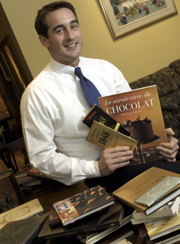
Jordan Le Bel with part of his extensive collection of food and chocolate
books, going back to 1742. Le Bel has a monthly segment on TVA’s
morning show, Salut Bonjour. On Tuesday,Feb. 12, at 8:35 a.m., he will
discuss chocolate and chocolate production. (Warning: explicit scenes
of chocolate.)
Photo by Andrew Dobrowolskyj
|
by Sylvain Comeau
The health craze may still be going strong, but Marketing Professor Jordan
Le Bel says that the backlash started over a decade ago: the revenge of
the pleasure seekers.
“For the past 10 or 15 years, pleasure has been a strategic tool
for marketers. They take it very seriously,” Le Bel said. “Also,
recent events have swung the pendulum back to pleasure. Since Sept. 11,
there has been an increase in the sale of comfort food around the world.
In times of crisis, people revert to safe, comforting values, and that
includes food.”
The larger trend was forecast by lifestyle guru Faith Popcorn in the famous
Popcorn Report, released in the early 1990s, in which she predicted
a backlash against constant health scares and warnings.
“She has been proven right,” Le Bel said. “Ten years later,
pleasure is everywhere. The words pleasure and experience are buzzwords
in marketing. On the British Airways Web site, it says, “Experience
our first class,” and they give you a virtual tour of it to try to
convince you that it’s worth spending the extra money.”
Le Bel joined Concordia last fall after completing his PhD at McGill.
He is a former chef and lifelong epicurean who owns a large collection
of cookbooks dating back to 1742, and he has taught restaurant management
in Norway. His research is in the area of hedonic consumption; he studies
consumer behaviour and food marketing, particularly the marketing of sinful
indulgences like chocolate.
“I’m a big fan of combining practice and theory, which is easy
when you are doing something you enjoy. I love chocolate, for example.
When I was doing my master’s, I started reading books on food, and
I realized that you can do serious work on the subject. So I decided to
start studying the marketing of pleasure and how it influences consumer
behaviour.”
Le Bel feels that no matter how much people worry about healthy diets
and waistlines, there will always be a prominent place for comfort food.
“Many studies have shown that human beings are hardwired from birth
to seek pleasure and avoid pain. That is an assumption of evolutionary
psychology. That makes perfect sense from a survival standpoint; you probably
won’t survive very long if you seek pain all the time.”
So it appears that pleasure is a human need rather than a frivolous indulgence,
or even a vice. Marketers appeal to that need by making appeals that largely
bypass the intellect.
“If you are buying winter tires, you look at factors like price and
functionality. Any purchase motivated by pleasure is really ruled by emotion,
whether it’s food or a vacation, and marketers must determine what
is it about the experience that gets to you.”
Such appeals are even starting to permeate the marketing of products which
were, until recently, sold based on their usefulness.
“Even products which are traditionally thought of as functional,
like a car, are being sold this way nowadays. Car marketing is moving
away from mileage per gallon and safety ratings. The images that are communicated
now are how cool you will look in that car, the plushness of the seats,
the great sound system, etc. That’s much more pleasure oriented than
getting from point A to point B without going to the garage. The principles
of pleasure marketing are being applied everywhere.”
New studies cooking
Marketers would probably have had to invent holidays like Valentine’s
Day if they did not already exist.
“Modern production methods mean that chocolate manufacturers can
produce a lot more volume than in the past; one-quarter of their sales
are at Valentine’s, Christmas, Easter and Mother’s Day. Some
people think that a box of chocolates shaped like a heart is tacky, but
that’s what sells.”
Le Bel is launching a new study in March in which lucky volunteers will
be fed chocolate and questioned about their reactions and attitudes.
“What I will be looking at is the influence of knowledge and expertise
on pleasure. There is an intuitive belief that a food or wine connoisseur
has more pleasure than others because of their knowledge. I want to check
if that is true.”
In another project, starting next week with Natalie Cooke of McGill, Le
Bel will be gathering food-related anecdotes. Information will be available
at johnmolson.concordia.ca/lebel.
Le Bel will present a paper at a June conference in Amsterdam, “The
Cultural Meaning of Food in the 21st Century.” He will also speak
with McGill literature professor Natalie Cooke in Concordia’s DeSève
Cinema on March 26, at 11:45 a.m. The title of their talk is “The
Construction and Marketing of Pleasure: Sweet Sensations in Foodbooks
and Advertising.”
Attendees will receive a chocolate treat.
|
|
|




